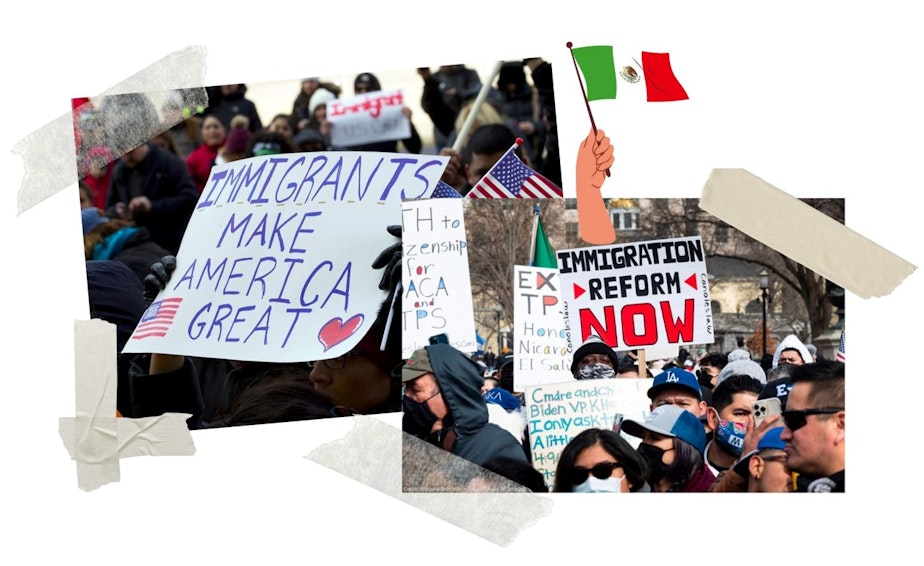'Being a citizen means you are free': One immigrant’s journey toward American citizenship

The process of becoming a U.S. citizen is often a long and complicated one.
RadioActive’s Eva Solorio talked with her family member about his journey to becoming an American citizen after immigrating from Mexico at 8 years old.
[RadioActive Youth Media is KUOW's radio journalism and audio storytelling program for young people. This story was entirely youth-produced, from the writing to the audio editing.]
B
ryan is in his mid-20s. He lives in Bellevue, and he’s kind of a tech bro.
(Bryan agreed to speak with me for this story on the condition that his last name wouldn't be published, citing concerns for his safety.)
Bryan came to the United States from Mexico with his parents and two siblings when he was in third grade. They came to find better living conditions and higher-paying jobs.
Sponsored
I asked him to describe how he felt at the time.
"I do remember coming here and knowing nothing, and just being shocked — culturally shocked," Bryan said. "Like where are all my friends? Where's my grandpa? My grandma? Like, where am I?"
In Mexico, Bryan lived in a close-knit town, where his extended family was part of his daily life. But when he moved to the U.S., it was a whole different world. He was in a new country, with new customs and a new language. He felt lost.
"As an 8-year-old, what can you do? I mean, you can cry, you can beg. But ultimately, things are gonna happen whether you like it or not," he said.
When Bryan was 14, he became a recipient of the Deferred Action for Childhood Arrivals program, or DACA. Having that status allowed him to live and work legally in the U.S. for two years at a time.
Sponsored
Bryan went to college and studied computer science, and last year, he got married. His marriage to a U.S. citizen makes him eligible to become a permanent resident. After at least three years as a permanent resident, he may become eligible to apply for citizenship.
But the process of applying for citizenship is extremely difficult. It can take years, even decades. Everyone’s path is different and there’s no cheat sheet to tell you how to do it. It’s confusing, and you may need a lawyer, which can be extremely expensive.
There’s also the emotional toll. Bryan said lawyers ask for lots of information.
"They asked me, ‘Hey, when did you last migrate here? Do you remember how you came?’ So it opened up this wound of like, okay, now I have to start reflecting on that trauma that I experienced initially because the process requires it," Bryan said.
Sponsored
As a U.S. citizen, there are many things that I can do that Bryan can’t, like apply for and receive federal student financial aid, leave and return to the country, and vote.
I went to Mexico earlier this year to visit our family’s hometown, but Bryan hasn’t ever been able to do that. Bryan longs to see his family, show his wife where he’s from, and be immersed in Mexican culture.
Watching my family members go through this makes me wonder: Why are there so many constraints to living freely?
To learn more, I spoke with Vanessa Gutierrez, an immigration lawyer with the Northwest Immigration Rights Project. She said immigrants have to work within a system that was built to exclude them based on factors like wealth and nationality, rather than welcome them in.
"I think the system is not set up to serve immigrants. It's set up to keep immigrants out a lot of times," she said.
Sponsored
Gutierrez said the U.S. immigration system needs to change to better serve immigrants, especially those who are undocumented, not wealthy themselves, or don't come from wealthy countries. She added that sharing immigration stories is one way to get there.
"It's important to tell stories, to show those in power — in elected positions — why it's so important to humanize immigration," she said. "Because we treat immigrants as the other, when we're all just human beings trying to live a better life."
For Bryan, part of that "better life" is the light at the end of the tunnel in his journey toward citizenship.
"I think being a citizen means you are free. You're free to vote. You are free to travel around the country. You are free to go to any university in the United States and be able to have some sort of government help," he said.
Every day, I see the stress and heartache my family members face because of their citizenship status. Gutierrez said it can be hard to understand this pain if you haven’t experienced it. She also emphasizes the importance of coming together when working toward justice.
Sponsored
"Let's start there. Let's understand each other," she said. "And then let's build a system together that is a little more just — a lot more just."
This story was produced in a RadioActive Youth Media Advanced Producers workshop for high school and college-age youth. Production assistance by Dayana Capulong. Edited by Diana Opong. Consultation support by Esmy Jimenez. Prepared for the web by Alayna Ly.
Find RadioActive on Instagram, TikTok, YouTube and Facebook, and on the RadioActive podcast.
Support for KUOW's RadioActive comes from the Bill & Melinda Gates Foundation Discovery Center and BECU.



